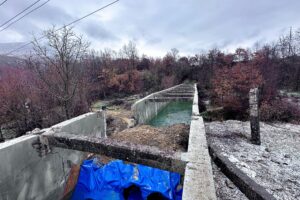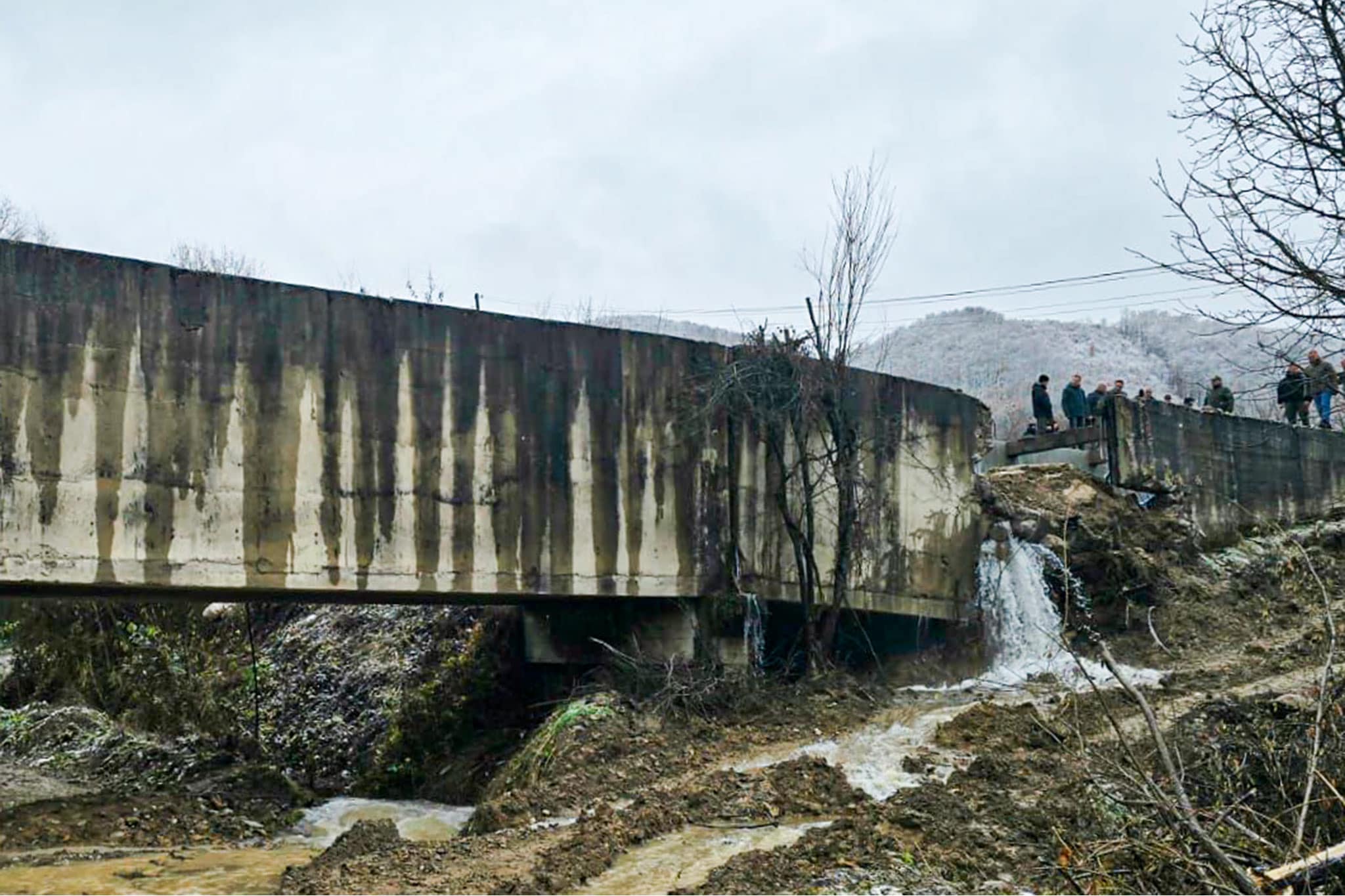Three attacks within 72 hours disrupted the peace in northern Kosovo and reignited tensions. Following the initial two attacks on the Police Station and the Municipal Building in Zvecan, the largest explosion occurred at the strategic Ibër-Lepenc canal in Zubin Potok, an attack described by Kosovo authorities as the most severe against critical infrastructure since the post-war period.
This act was followed by a Kosovo Police operation, which resulted in the arrest of several suspects and the confiscation of weaponry near the area. Meanwhile, clashes between Kosovo and Serbia intensified, with accusations of orchestrating the attack being attributed to a group of trained professionals. International actors called for calm and thorough investigations to uncover the truth behind this incident.
On the evening of November 29, a powerful explosion shook the village of Varragë in the Municipality of Zubin Potok, severely damaging the flow of the Ibër-Lepenc Canal. This vital canal, sourced by the Ujman Lake, supplies drinking water to several towns and provides water for the cooling systems of two power plants operated by the Kosovo Energy Corporation. According to authorities, approximately 20 kilograms of explosives had been planted at the blast site by still unidentified individuals. The supply of drinking water was temporarily disrupted, and in the immediate hours following the attack, emergency teams, including firefighters, remained stationed near the power plants.
Following the explosion, Kosovo’s Prime Minister, Albin Kurti, held a press conference where he accused Serbia of orchestrating the attack, linking it to a wave of assaults on critical infrastructure, including those in Ukraine.
"This criminal and terrorist attack was carried out by professionals and directed by Serbia, which has both the interest and the capability for such attacks. The large amount of explosives used poses a threat to Kosovo's energy supply," Kurti stated, adding that repairing the damage would be challenging.
He warned of ongoing disinformation campaigns and urged citizens to reject news sources that, according to him, have become part of a hybrid war against Kosovo. Without naming individuals, Kurti criticized certain analysts and opposition figures, accusing them of holding views that, directly or indirectly, take satisfaction in such incidents.
The Prime Minister’s statement at the press conference, which was supposed to focus on the explosion, was labeled “an attack” on the media.
Following the conference, Kurti called an extraordinary meeting of the Security Council, where additional measures were approved to strengthen security around critical facilities and services such as bridges, substations, antennas, lakes, canals, and more. In addition to the Kosovo Police, the Kosovo Security Force was deployed in the field, except in the north.
After visiting the Ibër-Lepenc Canal, Kurti mentioned again how the hybrid war has gained momentum.
“When we add to this the fact that, during this week, there have been major attacks involving over 200 rockets in Ukraine by the Russian Federation forces targeting critical infrastructure, particularly energy capacities, leaving over 1 million households in Ukraine without electricity, it is clear that the hybrid war has gained significant momentum. Moreover, what is described in military and defense strategies as kinetic warfare is also taking place, aiming to inflict maximum damage on critical infrastructure,” he said.
Meanwhile, emergency teams took measures to repair the damage and redirect the water flow back into the pipes. Authorities stated that a “temporary fix to the damaged canal” has been made and confirmed that the electricity supply has not been interrupted.
International support was also offered, as on December 2nd, Kurti held a meeting with the ambassadors of the Quint group, the EU and other countries accredited in Kosovo, to inform them about the attack.
The U.S. Ambassador to Kosovo, Jeffrey Hovenier, stated that his country condemns the "horrific" attack, adding that it is too early to determine the perpetrator and that at this stage, "no group or state can be excluded."
The attack was also condemned by the EU High Representative for Foreign Affairs and Security Policy, Josep Borrell, who described it as a "terrorist" and "sabotage" act.

Vendi ku u ndodhi shpërthimi në Ibër-Lepenc.
Burimi: ZKM
The arrest of the suspects and the confiscation of weaponry
Meanwhile, the Kosovo Police carried out operations at several locations in search of suspects related to this case.
On November 30, the Minister of the Interior, Xhelal Sveçla, along with the Police Director, Gazmend Hoxha, announced the arrest of eight individuals. During the operation, confiscated weaponry was displayed, including explosives, various equipment, emblems, military uniforms, and money. “These will serve as evidence for these criminal acts,” said Sveçla. Meanwhile, the Special Prosecution of the Republic of Kosovo (SPRK) announced that, in connection with the terrorist attack of November 29, ten suspects had been brought in for questioning by the Police. "By order of the prosecutor, two of them, with the initials D.V. and D.M., from the Serbian community, have been detained. For the person D.V., a request was made to impose pretrial detention, and the Court has set the pretrial detention for one month. Meanwhile, the suspect D.M. was released by the Prosecutor's Office under regular procedure. Furthermore, on December 1, 2024, by order of the prosecutor, the suspect J.V., also from the Serbian community, who had been wanted in connection with this criminal act, was detained. A search was conducted at his home, where a significant number of weapons and other equipment were seized," reads the Prosecutor's Office announcement.
The Court of Prishtina has imposed a one-month pretrial detention on D.V., who was arrested on suspicion of participating in the terrorist attack against the Ibër-Lepenc water canal.
The attack resulted in no human casualties, but residents in the surrounding area have spoken about the powerful explosion and the damages caused.
A Serbian resident from the village of Uglarë shared that his wife, frightened by the explosion and the large amount of water that had entered the house, jumped from the second floor. In addition to the damage to the house, which has become uninhabitable, he stated that their barns were also destroyed.
Serbia denies involvement in the attack
While the Government of Kosovo claimed that the attack was directed and orchestrated by Serbia, Serbian officials denied these accusations.
In fact, Serbia’s President, Aleksandar Vucic at a press conference, accused Kurti of staging the terrorist attack in the north. "As a serious state, we have not engaged in accusations, and we have stated that the attack was ordered directly by (Albin) Kurti. This will be proven by the investigation that we are also conducting," Vucic said.
He added that Serbia is ready to cooperate with the European Union, KFOR, and the professional authorities in Kosovo to clarify the case.
Meanwhile, Serbia's Foreign Minister, Marko Djuric, in a social media post, expressed his country's willingness to assist financially and technically in repairing the damage to the Ibër-Lepenc Canal, but also accused Kosovo of being under attack from "a coordinated propaganda campaign by Kurti's regime, aimed at undermining Serbia's path to the EU."
The attack was also condemned by the Serbian List, emphasizing that this act is absolutely against the interests of the Serbian people. "We request that KFOR and EULEX conduct an urgent investigation into this case. The damage to the water canal, in addition to threatening the water supply for citizens, has also caused concern among Serbs in the north of Kosovo," reads the Serbian List's statement.
Fear of revenge
The explosion in Zubin Potok has raised concerns and fear among Serbs that there may be reprisals from the Kosovo authorities.
Serbian opposition politician Aleksandar Arsenijevic, reacted to a post by the former deputy mayor of Prishtina, Selim Pacolli (AKR), who said: “Only the concept of ‘OLUJA’ works here! Classic cleansing of the terrain! Otherwise, this evil will always follow us.” According to Arsenijevic, this is an open call for ethnic cleansing and violence against Serbs in Kosovo.
"Oluja" (The Storm) refers to the operation on August 4, 1995, when the Croatian army launched "Operation Storm,“" an offensive to reclaim the Krajina region, which was controlled by Serbs. The offensive, which lasted only 36 hours, resulted in the death of around 526 Serbs, 116 of whom were said to be civilians, as well as the displacement of about 200,000 others.
A group of non-governmental organizations from northern Kosovo also condemned the attack on the Ibër-Lepenc Canal in Zubin Potok, calling on all social and political actors to approach the incident responsibly and act in accordance with the law. They also called on international organizations to ensure the proper functioning of police forces and to prevent the misuse of this event to increase pressure on the Serbian community in Kosovo.
*This article is published as part of the Western Balkans Regional Initiative against disinformation. “Western Balkans Anti-Disinformation Hub: exposing malign influences through watchdog journalism.”




























































